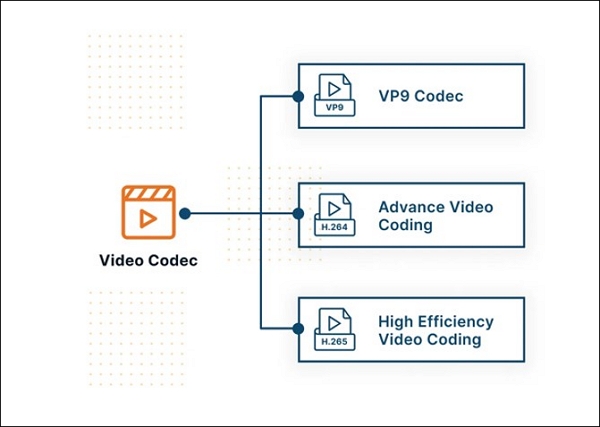- About
- Discover EaseUS
- Reviews & Awards
- License Agreement
- Privacy Policy
- Student Discount
When it comes to the term "video codec," you may often see this word when processing video files. But you may not know what the definition of a video codec is. This article will tell you what it is and how it works. Now, let's read this article to find the answer!
What Is a Video Codec and How Does It Work
A video codec is a kind of software or hardware that can compress or decompress users' digital videos. According to Wikipedia, a video codec is a collective name of an encoder and a decoder. As the name suggests, an encoder is used to compress your videos, while a decoder can help you decompress or decode the videos. Therefore, it can make your video files more tiny when being distributed and stored.

So, how does it work when you are transferring videos or storing videos? Video codecs aid in reducing the size and bandwidth of the video files, making them faster and simpler to send when you are transferring videos. For example, when you are posting them to a website or streaming them online, it works. Video codecs assist in preserving storage space and memory when you are storing movies or YouTube videos, whether you are doing so on your device or in the cloud. This makes storing videos more effective and practical.
People also Read:
Why Do Video Codecs Matter
So why are video codecs important for videos? There are some reasons as follows.
Reduce the size and bandwidth of video files
Video codec makes videos faster and easier to transfer, stream, and store, as video files are usually very large and take up a lot of storage space and bandwidth. By compressing them, video codecs can save storage space and memory and improve the loading speed and buffering of the videos.
Restore the original quality and playability of video files
Video codec makes videos clearer and smoother to watch and edit. Video files need to be decompressed before they can be played or edited on a device or system. By decompressing them, video codecs can recover the details and fidelity of the videos and improve users' viewing and editing experience.
Make videos more compatible and versatile
Video files can have different formats, such as MP4, AVI, MKV, etc., and different devices, such as computers, smartphones, tablets, etc., may have different requirements and capabilities for playing or creating video files. So, by encoding and decoding them, video codecs can convert video files into different formats and resolutions that meet different purposes and devices.
Common Video Codecs for Watching Videos
There are some common video codecs for you to refer to.
| Video Codecs | Description | Video formats supported |
| H.264/AVC | Suitable for streaming, cable TV broadcasting, and Blu-Ray disks | MP4, MOV, F4V, 3GP, TS |
| H.265/HEVC | Support 8k resolution | TS, MP4, 3GP, MKV |
| VP9 | Support Android and Chrome | WEBM, MKV |
| AV1 | Open-source, royalty-free | MP4, 3GP, MKV |
Conclusion
In a word, this article has provided some information about the question: what is a video codec? And it tells you the importance of video codecs for watching videos or making videos and movies. It is believed that you will get some helpful points from this article. You can share this article on your social media to help more people know about video codecs if you find it useful!
Was This Page Helpful?
Jean is recognized as one of the most professional writers in EaseUS. She has kept improving her writing skills over the past 10 years and helped millions of her readers solve their tech problems on PC, Mac, and iOS devices.
Related Articles
-
Multi-format Codec: A Comprehensive Guide
 Jean/2024-05-10
Jean/2024-05-10 -
Ultimate Guide to Variable Frame Rate [2024 Updated]
 Jane Zhou/2024-05-10
Jane Zhou/2024-05-10 -
Understanding Audio Bitrate: A Comprehensive Guide
 Jean/2024-05-10
Jean/2024-05-10 -
What Is Snapchat Ghost Mode? 😨[Detailed Info]
 Jane Zhou/2024-05-10
Jane Zhou/2024-05-10